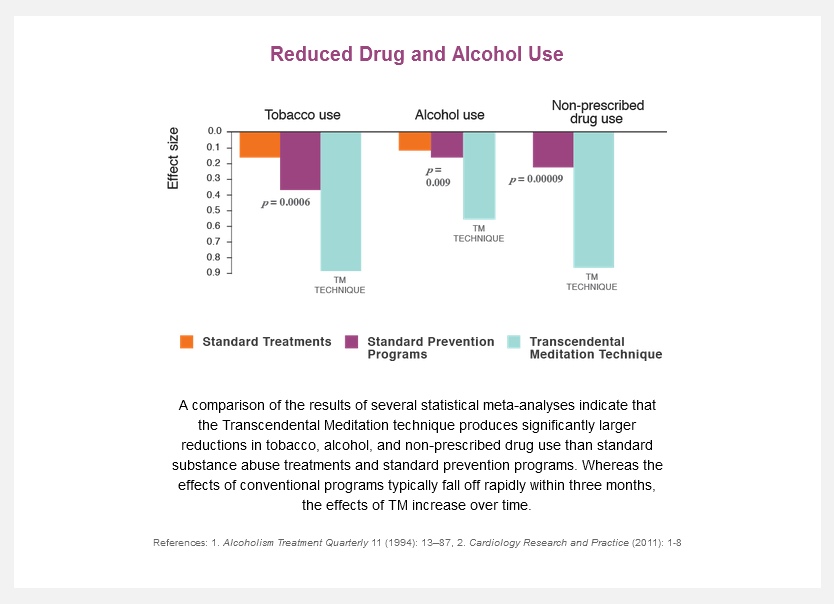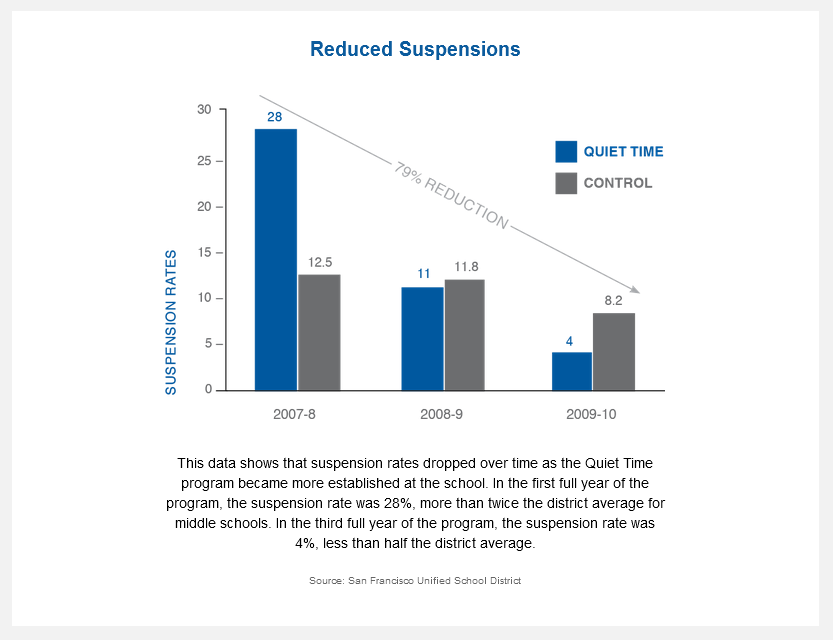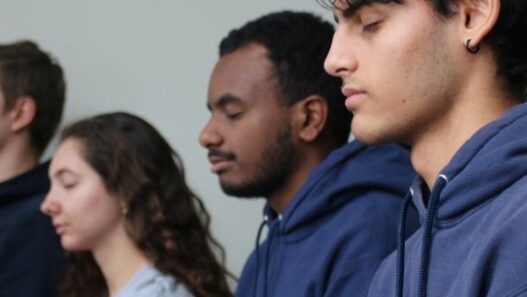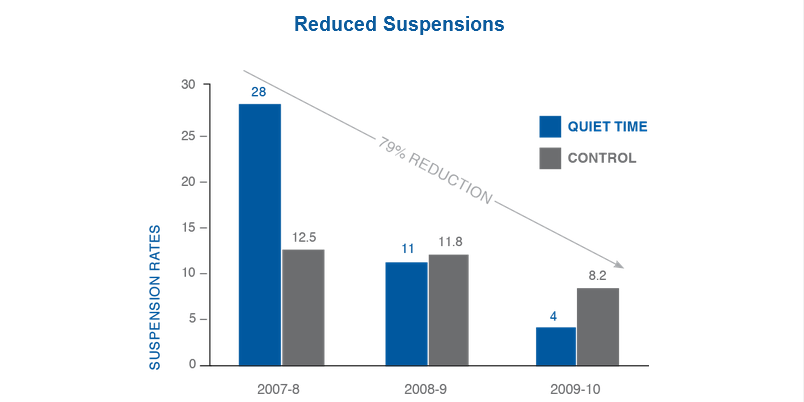This article investigates a summit at the United States Institute of Peace focusing on forty years of research on the effect of Transcendental Meditation (TM) practice on underserved populations.
The question the summit was looking to answer was whether an evidence-based, widely-practiced meditation technique can be utilized to reduce the devastating impact of post-traumatic stress among veterans, improve student performance and reduce violence among at-risk youth, and address the growing epidemic of alcohol and drug addiction in the general population.
The summit was moderated by the award-winning journalist Candy Crowley, current clinical professor of Psychiatry at Georgetown University and former NIMH senior researcher, Norman Rosenthal, M.D., and the executive director of the David Lynch Foundation (DLF), Bob Roth.
https://www.youtube.com/watch?v=5elrF6YykfQ
Bob Roth joked during the opening section of the summit that he used to say that the David Lynch Foundation worked on behalf of populations at risk from stress but corrected his wording after a doctor pointed out that nowadays this includes everybody.
So now Roth makes it clear that DLF’s focus is underserved populations, for whom the consequences of the growing epidemic of trauma and toxic stress are especially devastating.
Roth also pointed out that the high level of stress everyone faces in the modern world is part of the explanation for the growing popularity of meditation. Two other important factors that have brought the once-marginalized practice into the mainstream are scientific research that affirms its efficiency and the lack of medication that could lower stress levels without harmful side effects.
As an introduction, Candy Crowley shared her personal story of learning Transcendental Meditation. While she craved stress relief, she also feared that the practice could mellow her out too much.
So her teacher, Roth, called up David Lynch himself saying: “I’m with Candy Crowley and she’s afraid of losing her creative edge.” After finding out that Lynch, one of the most creative filmmakers of our times, has been practicing Transcendental Meditation every day for decades, Crowley was sold.
Dr. Rosenthal mentioned in the lead-in that considering the scientifically proven benefits of TM (such as the 23% lower death rate after ten years which one follow-up study found) it would make it worthwhile to practice even if was unpleasant, which it most definitely is not. He also stated that his patients who start meditating daily are usually able to overtime lower or stop medication altogether.
Healing veterans suffering from Post-Traumatic Stress Disorder
The focus of the first session of the summit was the application of Transcendental Meditation for alleviating Post-Traumatic Stress Disorder (PTSD) in combat veterans.
The panelists included Dusty Baxler (Executive director of Bolder Crest Veterans Treatment center), John L. Rigg, M.D. (Director of the Traumatic Brain Injury Program at the Dwight David Eisenhower Army Medical Center and Dave Zoberck (Director of the Resilient Warrior Program at Norwich University military college).
The testimonials from veterans that preceded the discussion underscored the need for tools that help former military personnel readjust to regular society.
One of the key messages from the panelists was the need to communicate to the former servicemen that there is nothing wrong with them, the issue lies in what has happened to them.
Dusty Baxler explained: “Combat changes people, forever. You have to come to an understanding of what that change is. And when you realize that you have been trained for these symptoms: that you are hyper-vigilant, you pay attention to detail, you tolerate no mistakes. You’ve been trained to react, straight away.
This is what gets you into trouble with mamma when she’s talking until you feel threatened, causing you to overreact. And then you are judged, you isolate, you self-medicated and you are in this loop, you cannot get back out of.”
“When you come home, no one teaches you how to dial that down and reconnect with yourself.
There is nothing wrong with you, it’s what happened to you. And let me show you how you can grow from there and be a better version of yourself.”
With this attitude, and veterans teaching veterans, the stigma is removed and progress can be made.

Dave Zobeck used a good analogy to explain the effect of Transcendental Meditation practice on veterans:
“I liken it to working out in the gym. When you are working out, and strengthening your body, when you leave the gym, you don’t leave your strength in the gym. When you practice TM and make contact with the deepest part of the human nervous system. This technique directs itself to the most powerful part of your own being, which is pure silence, pure awareness. When you are finished and walk out, it’s still there.”
Recovering from substance addiction through meditation
The second session of the summit focused on TM as a tool to aid recovery from substance use disorder, a problem that affects 25 million Americans directly and many more indirectly.
In a video testimonial, Celestine, a former alcohol addict who has been sober for six months, described the effect of Transcendental Meditation as follows:
“It takes me to a certain part of relaxation I did not think was possible.
The one regret I do have is that I wish I had done it earlier. Just so I could have had that much more of my life back.”
The panelists included Elizabeth Cairns, the Executive Director of The Peter G Dodge Foundation, which funds research on alcohol addiction recovery, Jan Gryczynski, Ph.D. Senior researcher at the Friends Research Institute who headed the six-month pilot study on TM and Cindy Feinberg, President of CPC and CAI and recovery coach.
As Jan Gryczynski pointed out in the video, one of the most promising findings from the pilot study on Transcendental Meditation was the adherence rates. He emphasized that adherence is the Achilles heel of any intervention when it comes to recovering alcoholics. In the pilot study, at a three-month follow-up, 80% of the participants had meditated at least 25 out of the past 30 days.
Cindy Feinberg explained that recovering alcoholics struggle with a chaotic mind. In her personal and professional experience, Transcendental Meditation is the best tool to address that.
“The difference is the peace that comes over them. I liken it to hitting pause before you send out that email that you might not want to send. Taking that space to make that decision before just acting on it.”
Feinberg pointed out that people who have substance abuse need help with impulsivity and Transcendental Meditation really helps with that.
The next speaker, Elizabeth Cairns, explained that the entrepreneur and philanthropist Peter A. Dodge struggled with alcohol addiction himself and found TM to be one of the effective tools for reducing his anxiety and helping him stay sober. Thus the idea was born for Dodge’s foundation to fund updating the research on TM and alcohol addiction recovery.
For Gryczynski Transcendental Meditation’s potential lay in its already established power to relieve stress: “We knew that stress has an important role in the vicious circle of stress, craving, relapse.”
Thus the pilot study with 60 patients (30 in the TM group, and 30 in the control group) was set up at an inpatient alcoholism treatment facility in Rockwell, Maryland.

The preliminary results are promising regarding the acceptance and feasibility of using TM in such a treatment setting, adherence to the practice, patients’ satisfaction with it, and improvements in various measures of stress, craving, alcohol use, and frequency. While considering the small sample size no statistically significant differences emerged between the two groups, the study nevertheless confirmed the potential of larger scale and longer-term research.
The panelists pointed out in the previous session on veterans that the main benefit of TM is how simple it is to practice it. One cannot ask a veteran with PTSD who has been battling with insomnia for years to concentrate. The same idea surfaced once again in this session.
Feinberg explained: “For someone who’s got an addictive brain, a chaotic brain, it’s got to be clear, it’s got to be simple, there’s got to be a quick solution. It cannot be something that will jumble their mind and that’s why I love TM.”
Saving students from the harmful results of toxic stress
The third session of the summit concentrated on TM’s impact on students in disadvantaged communities.
In the introductory videos, students, educators, and school staff pointed out that Transcendental Meditation practice has been well received by the students and has improved their focus, grades, happiness levels, and the overall atmosphere of the schools.
Michael Barakat, the principal of Bronx High School for Law and Community Service, summed up his experience: “Meditation is a tool every single human being should have, just like we teach math, science, social studies, and English, just like we mandate physical education, we need to teach students TM. This is something that should be foundational in education.”
Bob Roth in turn quoted the Surgeon General: “If Americans are swimming in the ocean of stress, our children are drowning in it.”
The panelists for the third session included Rena Boone, Director of the Quiet Time Program at Ideal Academy Public Charter School, William Stixrud, Ph.D., Clinical Neuropsychologist and Assistant Professor of Psychiatry, Behavioral Sciences and Pediatrics (George Washington University), and John Wolf, a Senior Program Manager at University of Chicago Crime Lab and Urban Education Lab, who runs the first-ever randomized controlled trial on effects of the TM based Quiet Time program in underserved Chicago public high schools.

Wolf pointed out that growing up in violent communities results in a clear disadvantage for children as the stress they experience lowers their cognitive capacities.
“If you are worried because a family member or a friend is a victim of gun violence, how can you be expected to sit and focus on your algebra homework?” Wolf asked.
Moreover, when the students are not operating to their full potential, they also cannot benefit from the additional social programs that are set up to mitigate the effects of their disadvantaged surroundings.
Wolf explained that The Chicago Crime Lab picks interventions for its large-scale, rigorous, studies that a) are already applied in practice and b) have promising results. So when they came across Transcendental Meditation which has successfully been used with more than 500 000 students around the globe, it was a natural fit.
For the pilot study, some of the most difficult schools and classes in Chicago were picked yet both students and faculty have received TM well and the results are positive.
Dr. Stixrud emphasized the importance of such effects of TM on students as cultivating relaxed alertness, improving brain organization and coherence as well as deep relaxation which has healing effects on mind and body. He also pointed out that an improved ability to inhibit is one of the crucial outcomes of a regular Transcendental Meditation practice for young people as it helps them make better choices.
Dr. Stixrud also mentioned that many children in these violent communities suffer from sleep deprivation, as the high levels of stress they experience cause insomnia. With TM practice, many experiences the feeling of safety for the first time and thus are able to sleep better, which in turn is crucial for the optimal development of young brains.
As the panelist concluded, while TM will not be able at once to change the challenging environment in which these kids live, it can alleviate the ill effects it has on their social, emotional, and academic development.
SEE MORE: The Program of the National Summit on the Science of Meditation, Trauma, Stress and the Brain



















